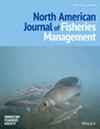河道外储存的流量增加改善了鲑鱼的栖息地和生存
IF 1.4
4区 农林科学
Q3 FISHERIES
引用次数: 0
摘要
在美国西部,鲑鱼和钢头鱼的幼鱼在旱季特别容易受到水流枯竭的影响。将河道外水库的水释放到小溪中是一种新的恢复策略,以抵消人为流量变化对鲑科鱼类的影响。到目前为止,还没有研究评估小规模流量增加的生态效应。在这里,我们量化了一个这样的增强项目对栖息地连通性、水质、无脊椎动物漂移、幼鱼运动和生存的影响。我们的研究是在北加州的一条溪流中进行的,包括一个异常潮湿的夏天(2019年)和一个更典型的干燥的夏天(2020年)。我们发现,两年间环境流量的差异介导了13.9 L/s强化处理的物理和生态效应。枯水年,生境连通性和溶解氧显著增加;而在丰水年,对这些变量的影响可以忽略不计。在这两年中,无脊椎动物漂移量在增加后略有增加。在干燥的夏季,野生幼鱼(Oncorhynchus mykiss)和放养的银鲑(O. kisutch)的池内运动在增加后增加,而在潮湿的夏季则没有增加。流量的增加提高了鲑科鱼类的存活率,在干燥的夏季比在潮湿的夏季效果更大(钢鲑的存活率提高24%,钢鲑的存活率提高20%)(钢鲑的存活率没有影响,而钢鲑的存活率提高11%)。该研究表明,适当设计的小规模流量增加可以改善小溪中养殖鲑鱼的条件,特别是在干旱年份。更广泛地说,它提供了经验证据,表明恢复夏季小型鲑鱼溪流的流量可以产生显着的生态效益。本文章由计算机程序翻译,如有差异,请以英文原文为准。
Flow augmentation from off‐channel storage improves salmonid habitat and survival
Abstract In the Western United States, juvenile salmon and steelhead are especially vulnerable to streamflow depletion in the dry season. Releasing water from off‐channel storage into small streams is a novel restoration strategy to offset impacts from anthropogenic flow alteration on salmonid fishes. To date, no studies have evaluated the ecological effects of small‐scale flow augmentations. Here, we quantify the effects of one such augmentation project on habitat connectivity, water quality, invertebrate drift, juvenile salmonid movement and survival. Our study took place in a Northern California stream and included an unusually wet summer (2019) and a more typical dry summer (2020). We found that differences in ambient streamflows between the two years mediated the physical and ecological effects of a 13.9 L/s augmentation treatment. In the dry year, habitat connectivity and dissolved oxygen markedly increased at sites > 1.5 km downstream from the point of augmentation, whereas during the wet year effects on those variables were negligible. In both years, invertebrate drift marginally increased following augmentation. Inter‐pool movement of wild juvenile steelhead ( Oncorhynchus mykiss ) and stocked Coho Salmon ( O. kisutch ) increased following augmentation during the dry summer but not the wet summer. Flow augmentation increased the survival probability for salmonids, with a larger effect during the dry summer (24% higher survival for Coho Salmon and 20% higher for steelhead), than during the wet summer (when no effect was observed for steelhead survival and Coho Salmon survival increased by 11%). This study indicates that appropriately designed small‐scale flow augmentations can improve conditions for rearing salmonids in small streams, particularly during dry years. More broadly, it provides empirical evidence that efforts to restore summer streamflow in small, salmon‐bearing streams can yield significant ecological benefits.
求助全文
通过发布文献求助,成功后即可免费获取论文全文。
去求助
来源期刊
CiteScore
2.60
自引率
18.20%
发文量
118
审稿时长
2 months
期刊介绍:
The North American Journal of Fisheries Management promotes communication among fishery managers with an emphasis on North America, and addresses the maintenance, enhancement, and allocation of fisheries resources. It chronicles the development of practical monitoring and management programs for finfish and exploitable shellfish in marine and freshwater environments.
Contributions relate to the management of fish populations, habitats, and users to protect and enhance fish and fishery resources for societal benefits. Case histories of successes, failures, and effects of fisheries programs help convey practical management experience to others.

 求助内容:
求助内容: 应助结果提醒方式:
应助结果提醒方式:


